Description: War Thunder is a next generation military MMO game dedicated to...

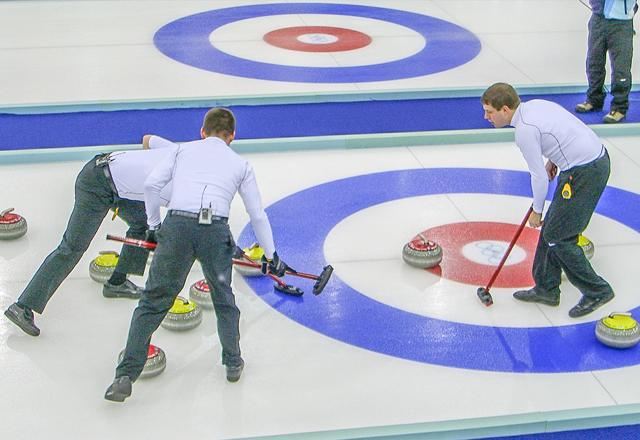
Fans of sports competitions will not have to wait long, because the 2018 Winter Olympics in Pyeongchang will be held on February 9-25. Athletes from different countries, demonstrating achievements in 7 sports, 15 disciplines.
The 23rd Winter Olympics 2018 in Pyeongchang (South Korea) in 2018 promises to be exciting and attract a huge number of visitors. The date of the event is from 9 to 25 February 2018. It is interesting that the first applications for holding the games were submitted on October 15, 2009. Pyeongchang was approved as the venue for the Games on July 6, 2011.
As the capital of the Games, they decided to try the forces of 3 cities. One of them is Munich, Germany. Summer was here Olympic Games back in 1972, there were no more competitions in Germany. The second city from which the application for participation was received is Annecy, France. He first decided to try his luck at hosting the Games. The third city is Pyeongchang, Republic of Korea. This was the third application from this city, which was granted.
Before traveling to Pyeongchang, it is always interesting to find out why this city was chosen as the winter capital of the Games. The history is quite interesting. The hard-working authorities of the city applied for participation three times. In 2010, Vancouver, Canada won by three votes. In 2014, between Pyeongchang and Sochi, Russia, the difference was only 4 votes.
The defeats of previous years did not break the faith of the government South Korea into victory. In the few years that remained until the next Olympiad, the city underwent a large-scale reconstruction, an excellent sports infrastructure was built. In particular, there were:
Many international competitions and championships have already been held here. All this had a positive impact on the reputation of the city, and in competition with Anse and Munich, Pyeongchang was given the first place. The latter won by a huge margin - 63 votes for Pyeongchang and only 25 votes for Munich.
Video plot
Pyeongchang is a county located in the central part of Gangwon Province in northeast Korea. To come to Pyeongchang, you need to get to Seoul by plane. It is best to purchase tickets in advance. In this case, you will be able to save.
From Seoul to Pyeongchang can be reached by car. The fare is about 1200-1800 rubles, since a liter of gasoline in Korea will cost 84 rubles. At the same time, car rental will cost at least 3000-4000 rubles per day.
The second way is to take the bus. The road takes about 2-3 hours, provided there are no traffic jams. The ticket price varies in the range of 350-500 rubles. You can also use the services railway. It is currently under construction, but commissioning is scheduled for the near future. The ticket price is not yet known.
Sukhoran (a white tiger) and Bandabi (a bear from the Himalayas) are the symbols of the 2018 Winter Olympics. These characters are one of the most beloved in the country. Tiger - main character most Korean stories. The shade of the animal's skin is associated with winter and snow. The authors are sure that he personifies the protection of the participants of the sports show, inspires confidence in the Olympiad.
Bandabi the bear became the mascot of the Paralympic Games, which will be held in Pyeongchang after the main ones. The emblem of the Olympiad is represented by a harmonious interlacing of two symbols. A snowflake is an indicator that the Olympics are winter. The first symbol is chosen so that it personifies the harmony between nature and people.
The program includes 7 sports and 15 disciplines. An interesting feature What distinguishes the Winter Games from the 2014 Games is the introduction of auxiliary competitions in snowboarding, mass starts in speed skating and combined doubles in curling. On the other hand, the parallel slalom was abandoned.
Competitions will be held in the following areas (in brackets are the sets of medals that will be played between athletes):
A total of 102 sets of medals will be played.

Anyone who plans to attend the Olympics or watch it on TV is interested in the schedule. It is too early to talk about the exact schedule, but an approximate one is presented in the table.
| the date | Planned events |
|---|---|
| 9.02.18 | Grand opening |
| 10.02.18 | On this day, competitions in skiing and short track will be held. After 20:00 pm it will be possible to go to the biathlon, speed skating competitions and drop in on ski jumping athletes. |
| 11.02.18 | 11.02 will hold competitions in alpine skiing and snowboarding. In the afternoon there will be cross-country skiing, skating and sleigh races. Freestyle and biathlon are planned in the evening. |
| 12.02.18 | In the morning there will be competitions among athletes of snowboarding and figure skating. In the afternoon you can visit skiing. In the evening athletes will compete in biathlon, freestyle, skiing and speed skating, as well as ski jumping. |
| 13.02.18 | Snowboard competitions will be held in the morning. In the afternoon - skiing. Luge and short tracks with a difference of half an hour will be held in the evening. Skating and skiing, as well as curling, will finish the competition on 13.02. |
| 14.02.18 | Athletes on snowboards will compete in the morning, skiers will compete in the afternoon. In the evening will pass skiing and ice skating. Luge and biathlo will be the end of the sixth day of the games. |
| 15.02.18 | Before lunch you will be able to watch figure skating and skiers, in the afternoon skiing and snowboarding will again be shown. Completion will be luge, biathlon, speed skating. |
| 16.02.18 | There will be an opportunity to cheer on athletes in such disciplines as bobsleigh, freestyle, snowboarding, skiing and speed skating. |
| 17.02.18 | In the morning there will be competitions in alpine skiing, freestyle and figure skating. In the evening it will be possible to visit competitions in ski jumping, short track, skiing, skeleton, biathlon. |
| 18.02.18 | After lunch, you will have the opportunity to go to the show of alpine skiing, skiing, freestyle, biathlon, speed skating. |
| 19.02.18 | 19.02 competitions will be only in the evening - ski jumping, speed skating, bobsleigh. |
| 20.02.18 | On this day, competitions in freestyle, biathlon, short track, Nordic combined and figure skating will be held. |
| 21.02.18 | On this day, it will be possible to attend competitions in bobsleigh, skiing, alpine skiing and speed skating, freestyle. |
| 22.02.18 | Initially, freestyle competitions will be held, then ski races. After the break, you can visit Nordic Combined, Short Track, Ice Hockey and Biathlon. |
| 23.02.18 | In the morning you can expect snowboarding and figure skating. After lunch, skiers and freestyle specialists will compete. In the evening, biathletes, skaters and curlers will complete the program. |
| 24.02.18 | The morning of February 24 promises to be eventful - skiing, snowboarding in several categories. After lunch, you can go skiing, see ice skating and curling. |
| 25.02.18 | Bobsleigh, hockey and cross-country skiing will be the last competitions of the Olympiad. Closing of the Olympiad. |
It is important to take into account the time difference between countries. For example, between Moscow and Pyeongchang the difference is 6 hours. This should be taken into account when flying and when watching games in live streaming mode.
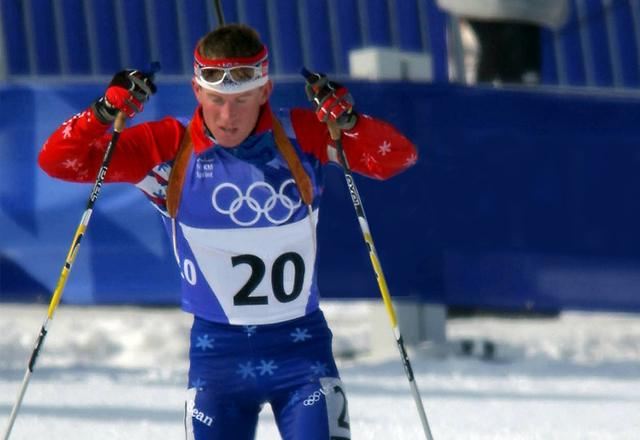
The layout of the objects erected for the Olympiad resembles the one from Sochi. In particular, the buildings were grouped around the tracks and masses of fans. The main place of construction is Alpensia, which impresses with picturesque mountain landscapes.
The ski jumping park will be used as a venue for the opening and will have a capacity of 60,000 spectators. The complex has springboards K-125 and K-95, which are prepared for competitions in biathletes and jumpers in accordance with international standards. The ski and biathlon center will host races of athletes of the respective sports. The room itself is designed for 27,000 observers.
The luge center will be used for skeleton athletes, lugers and bobsledders. The total number of possible visitors is 10 thousand. Alpine skiing competitions are planned to be held at the Yenpyeong base. It is called Mecca - the most snowy place in Korea. At the Chungbong Stadium, there is an opportunity to admire the athletes who specialize in downhill skiing.
Another important sports facility is Gangneung. This is a coastal cluster where a hockey center has already been built. This is a temporary building designed for 10,000 fans. The architects did their best to create the building, giving it the shape of a snowdrift. Gwangdong University will host the qualifying matches for the group tournament. Curling athletes will show their skills on the ice rink. It is designed for 3 thousand people. Free-standing indoor ice rinks have been prepared for the show of short track professionals, skaters and figure skaters.
Skiing
A year later, South Korean Pyeongchang will host the XXIII Winter Olympic Games. The Rambler/Travel correspondent visited the future capital of the Olympics and found out how the Koreans were going to amaze the world, and what will remain for tourists after the Games.
The road of South Korean Pyeongchang to the status of the capital of the Olympic Games was not easy. The city has been waiting for this for more than 15 years: in 2003, it lost to Canadian Vancouver for the right to host the 2010 Winter Games. In 2006, in the fight for the 2014 Olympics, luck smiled on Russian Sochi.
And only from the third time - in July 2011 - the Koreans saw the sign "PYEONGCHANG 2018" in the hands of IOC President Jacques Rogge. By the way, now this tablet is kept in the city museum dedicated to preparations for the Olympics.
XXIII Winter Olympic Games in Pyeongchang (Republic of Korea) will be held from 9 to 25 February 2018. The competition program includes 15 disciplines: figure skating, hockey, biathlon, speed skating, short track, curling, alpine skiing, skiing, freestyle, Nordic combined, ski jumping, snowboarding, bobsleigh, skeleton and luge. 102 sets of medals will be played.
South Korea
in the guide
Among the places where you can already look into the near future of the planet, South Korea is one of the most preferred options. Judging by the main Korean cities, the 22nd century has long been here. Futuristic subway trains “fly” underground, megacities are “covered” with ubiquitous free Wi-Fi, and toilet bowls, even in the cheapest cafes, are equipped with control panels.
The Winter Olympic Games in Pyeongchang will be held in two clusters - mountainous (Alpensia resort) and coastal (Gangneung city). There is a clear analogy with Sochi. But you should not blame the Koreans for copying the Russian Olympics. If you remember, Pyeongchang fought for the Olympics back in 2003, and it was then that construction began in the mountains 30 km from Pyeongchang ski resort, which was supposed to host the main competitions of the Games. And the loss of the city in the vote did not lead to a halt in construction: the Koreans believed that someday the Olympics would be here.
The main facilities of the resort were completed just in the year when Jacques Rogge at the IOC session announced Pyeongchang as the capital of the 2018 Olympics.
in the guide
The optimal time for a visit to Seoul is three to four days. There will be enough impressions to boast for the next five years: “I have already visited the future”, but there will still be enough strength to return home, to the “home” past.
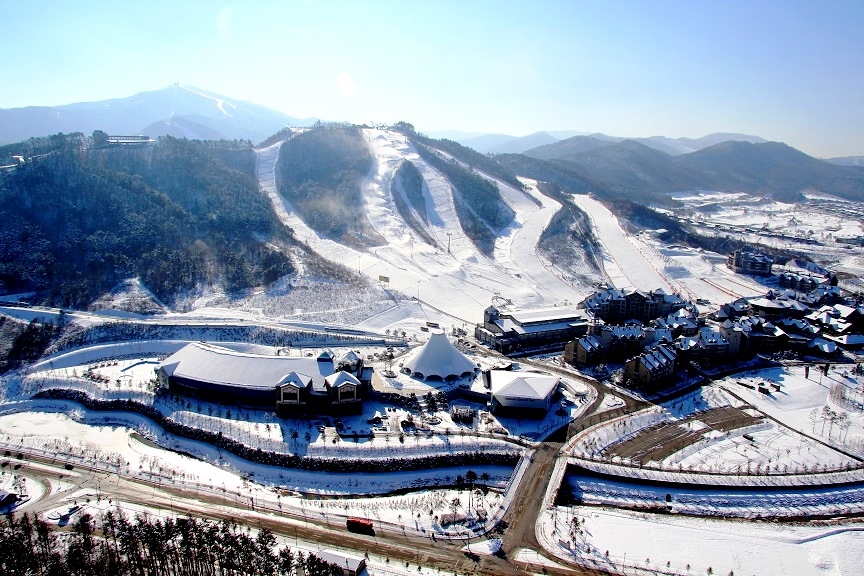
Resort "Alpensia"
For the Olympics in Korea will build a new high-speed road that will connect Seoul and Pyeongchang. Travel time by car will be about two hours. Also from Incheon, where the international airport is located, a high-speed train will be launched to Gangneung. Travel time is 98 minutes.
The name "Alpensia" comes from two words - Alps and Asia. During the construction, the authors of the concept used the best practices of European ski resorts in the Alps, but did not forget that they are building in another part of the world and mostly for Asian residents.
Now Alpensia is probably the most popular resort in Korea. The complex is divided into three zones: a golf course (in summer), an area with hotels, restaurants and a water park, as well as an area for winter sports.
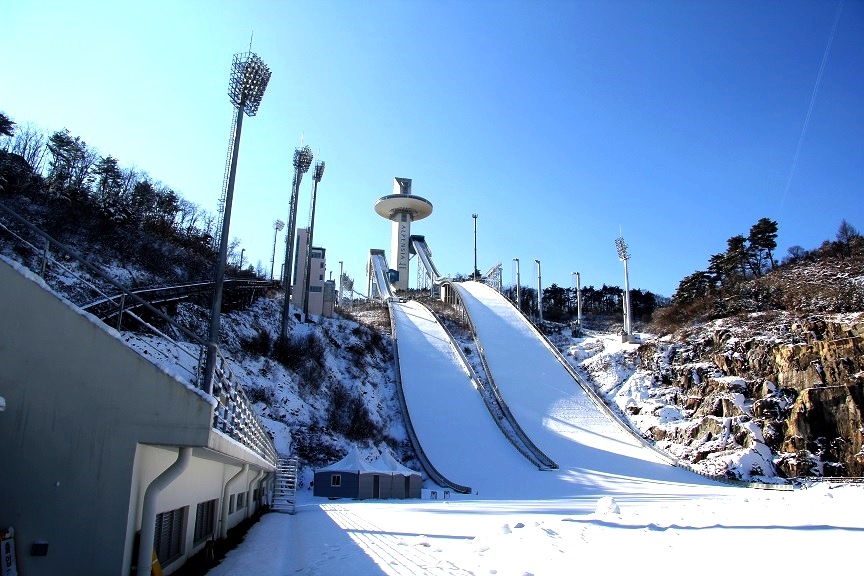
There is a jumping board here - a very popular place in Korea, as several local series and TV shows were filmed here. It is here that ski jumping competitions will be held in a year.
In addition, in the Alpensia area during the Olympics, in addition to ski jumping, competitions in biathlon, cross-country skiing, bobsleigh, skeleton, luge, freestyle and snowboarding will be held.
The white tiger Sukhoran became the mascot of the 2018 Olympics, and the Paralympics - Himalayan bear Pandabi. According to ancient legends, the spirit white tiger lives in Korea, protecting the land and people. The bear is a symbol of will and courage.
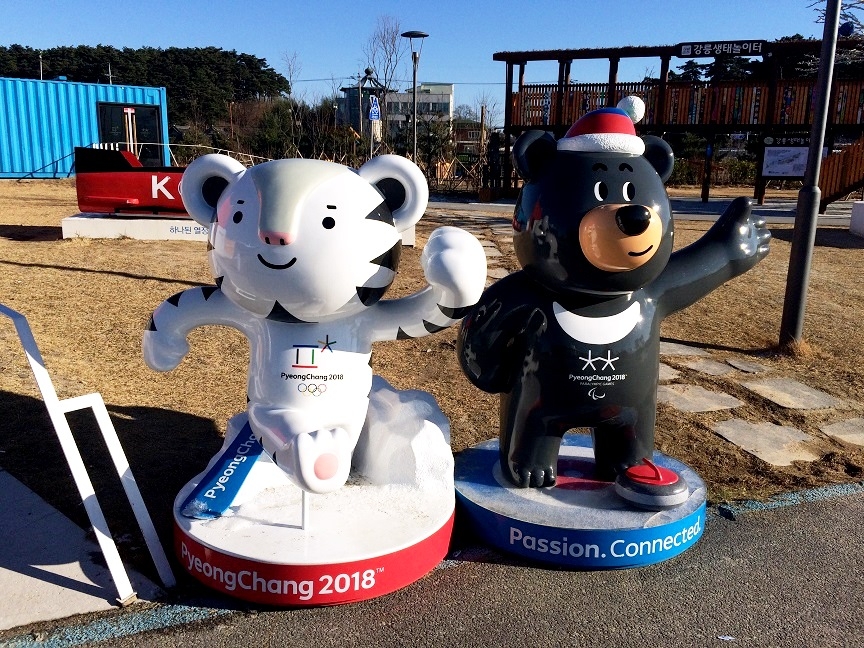
A special pride of the Koreans is the bobsleigh complex. Usually it is built in the open air, but the Koreans for the first time created part of the structures at the factory, after which they mounted them at the competition site. “Minimum exposure of parts of the track to the open air reduces the impact on the metal structure,” the South Korean Olympic Committee explained.
On average, the length of bobsleigh tracks is about 1500-2000 meters. In Korea - 2018 meters (the year of the Olympics). Moreover, at the end there will be a very gentle descent, which will not be used during the Olympics. But after the Games, this is where tourists will be able to try their hand at sledding: in South Korea, they believe that this will be a very popular attraction.
By the way, the gentle descent of the route for guests will also work in summer: it will be possible to go down on special sleds on wheels.

Alpine skiing competitions - giant slalom and slalom - will be held at the Yongpyeong resort, which is practically part of Alpensia. It is believed that this is where the most snow in South Korea. But during the Olympics, athletes will move out mainly on artificial snow.
Yongpyeong has 30 slopes, including the longest in Korea. Every year a large number of skiers and snowboarders come here: Koreans generally call Yongpyeong "Mecca".
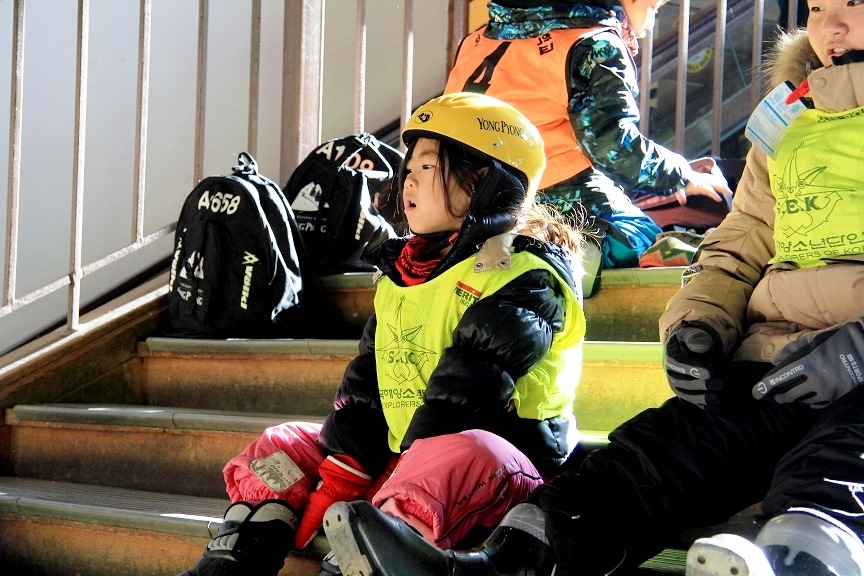
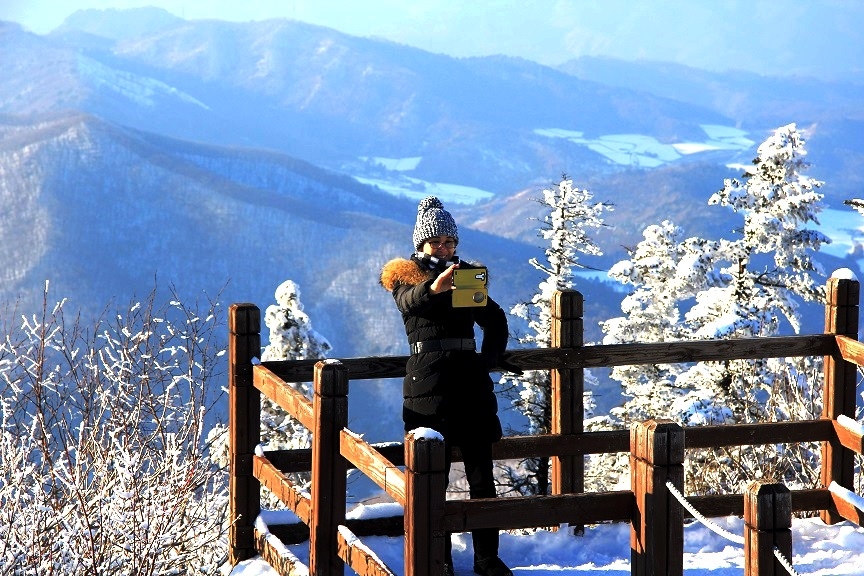
Olympic ice competitions - curling, speed skating, hockey, short track and figure skating - will be held in the coastal cluster, which is located in Gangneung. This city stands on the east coast of Korea, 30 km from Pyeongchang. And if in the mountains a lot of infrastructure was already ready, then on the coast all the facilities had to be built from scratch.
Now in Gangneung, for example, the skating arena has already been built - this is the largest structure without central pillars in Korea (width 240 m, length 120 m). In December last year, a round of the World Short Track Championship was held there, which became a kind of testing of the arena before the Olympics.

Nearby is a hockey stadium, where for the first time in the country for each spectator there will be seat heating.
Speaking of previous Winter Games, which took place in Sochi, the Korean Olympic Committee says that the Olympics in Russia have fulfilled their most important task: to show the whole world how beautiful the nature of Russia is and how rich its history, traditions and culture are. And now Koreans will try to acquaint the world with culture and traditions, art, cuisine and the latest technologies of their country.
After the Games, Alpenzia will turn into a world-class resort. “Now tourists from China, Japan and more southern countries Asia to ski fly to Canada. Now they will be able to visit us,” says the representative of the Olympic Committee.
February 13, 2017 9:14 amThe Olympic Games are not only the largest sporting event, but also a huge cultural holiday for millions of fans around the world. Competitions held both in summer and in winter time of the year. The last games were held in 2014 in Russia, in the city of Sochi, and amazed the public with their grandiose scope. The next Winter Olympics - 2018 - will be held in the city of Pyeongchang.
The city of Pyeongchang is located in South Korea, on its territory it will host the XXIII Winter Olympic Games. For the right to become the capital of world sports, this city fought for a long time. Applying twice, he lost first to the Canadian Vancouver, and then to the Russian Sochi. However, the Korean representatives have always been characterized by confidence and constancy, perhaps it was for this that once again luck decided to smile at them.
The definition of the city of Pyeongchang as a venue for the Olympiad took place on July 6, 2011. Thus, South Korea received enough time to carry out all the necessary preparations for the main sporting event. small town Pyeongchang was able to bypass the fairly well-known major European cities of Munich and Annessy in the first round of voting. It is worth noting that many analysts considered South Korea the favorite in this sports race in advance.
The Korean athletes made a great impression on the jury of the Olympic Committee. The well-known champion Yoo Na Kim delivered a speech to them. It was she who had the honor to tell the whole world about how winter Olympics can change the history of sports in her country. By her example, she convinced everyone that South Korea's competition for the right to host the Olympic Games gave a new impetus to sports, stadiums and tracks began to be built, and conditions were created for the education and training of athletes. The Olympic champion confirmed her words a couple of days before the performance - at the rink, showing the greatest class of skating.
The next Winter Olympic Games will be held in a Korean city Pyeongchang(Pyeongchang, 평창). This will be the 23rd Winter Olympic Games. They will be held from 9 to 25 February 2018.
Most of the competitions of the 2018 Olympic Games will be held at the Alpensia ski resort. You can read more about it on the official website of Alpensia. The opening and closing ceremonies of the 2018 Winter Olympics are also planned to be held in Alpensia.
 Read about the centers for hosting various Olympic venues in Pyeongchang (in English).
Read about the centers for hosting various Olympic venues in Pyeongchang (in English).
Pyeongchang is not a mountainous city. The average height in the county is only 700 meters. Accordingly, there are no problems with oxygen on the mountain slopes, and the local nature is considered the cleanest in all of Korea. In addition, the mountains of Gangwon-do beautiful place for trekking, here you can also ride horses and go fishing in mountain streams. The local climate is very similar to the Alpine one, some similarities can be seen in the landscapes. It is especially beautiful in the Korean mountains in autumn, when the slopes and passes turn red and gold. At the same time, the mountains are most crowded - mountain walks are especially loved by Koreans in the autumn. The ski season in the mountains in Pyeongchang County lasts from November to April.
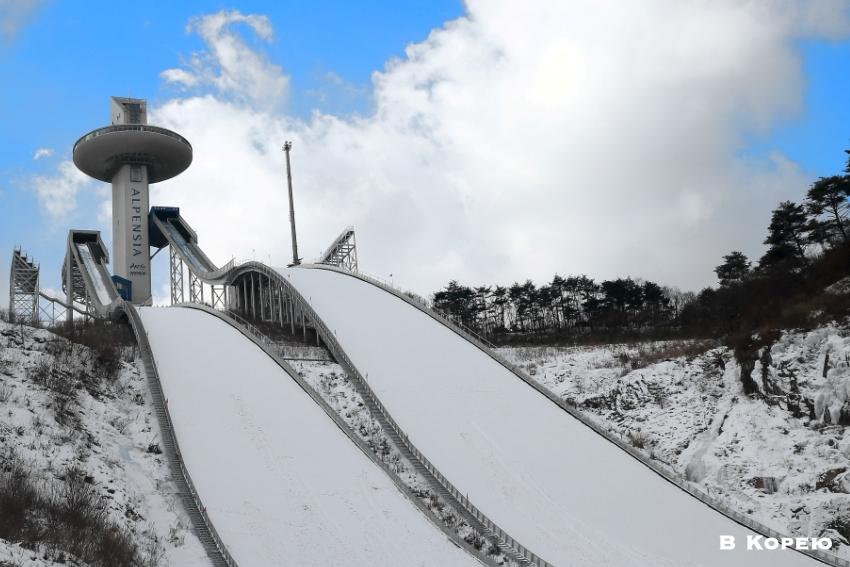 Pyeongchang has been nominated to host the Winter Olympics three times, but twice lost this title to Vancouver in 2010 and Sochi in 2014. The Olympic Games in Korea promise to be held at a high organizational level, since Pyeongchang has already hosted international winter sports competitions more than once, including the World Cup and stages of the Biathlon World Cup.
Pyeongchang has been nominated to host the Winter Olympics three times, but twice lost this title to Vancouver in 2010 and Sochi in 2014. The Olympic Games in Korea promise to be held at a high organizational level, since Pyeongchang has already hosted international winter sports competitions more than once, including the World Cup and stages of the Biathlon World Cup.
Several festivals are held in Pyeongchang: trout (almost all winter), snow (in January), music (in July), potatoes (in mid-August), mountain flowers (in early August), national Korean culture (in September), Buddhist culture (in October). In the winter, Pyeongchang hosts some really crazy events. For example, a marathon in underwear (in winter!), car racing in the snow and a climbing competition on icy mountains, and the winter trout festival can be attributed to the extreme section - fish are caught in winter in mountain river with bare hands.
From Seoul to Pyeongchang can be reached in 2 and a half hours. Now large-scale road construction is underway in Korea, and from 2017 it will be possible to get to Pyeongchang by high-speed.